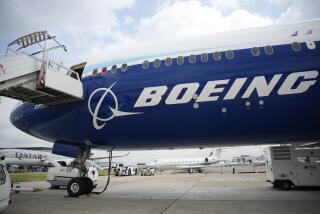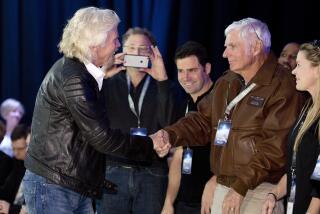Learning from the ground up
The gig: Jeff Potter, 54, is chief executive of Surf Air, a Santa Monica start-up that operates a members-only luxury jet service offering unlimited trips throughout California and to Las Vegas. The company is negotiating agreements for flights to Phoenix and has ambitions to expand into other high-population regions such as Texas and the Northeast. Surf Air recently acquired $65 million in financing to purchase 15 new Pilatus PC-12 NG planes, with options to acquire 50 more in coming years. “Whether we like it or not, there are stress points when you fly these days,” Potter said. “What we’ve done is we’ve reduced, if not removed, those.”
Military brat: Potter has heard the sound of propellers and jet engines for as long as he can remember. His father was a career Air Force pilot who flew rescue helicopters in Vietnam in the 1960s. During Potter’s younger years, the military lifestyle meant stints in Okinawa, Japan; France; Arizona; Oregon; Edwards Air Force Base; and eventually Spokane, Wash. “Greatest way to grow up ever,” he said.
Frustrated flyboy: Potter thought about following in his father’s footsteps (both his brother and nephew have also been military pilots), but he didn’t have good enough vision to fly in the Navy or Marines. And, he confessed, “I’m an airline CEO who’s afraid of heights.” While attending Washington State University, he tried his hand at a naval flight officer training program one summer, where he learned navigation skills. But by his junior year, the military phased out the program, and he decided to shift focus.
Learning from the ground up: During college, Potter strung together work at the airport in Spokane. He stocked planes with food while working for an airline catering company, and occasionally he would take overnight shifts cleaning jets for Frontier Airlines, then a mid-size operator based in Denver. A manager noticed his work ethic and recommended him for a ticket agent opening in Oakland in 1981. He was quickly immersed in the frontline work of the industry: He sold tickets on site, conducted pre-flight checks and oversaw baggage and cargo operations.
From point A to point B: Potter asked a lot of questions, and he was especially curious to know how a company deployed so many planes to get so many people where they needed to be. “It looked complicated. I thought ‘Boy, how do you keep track of 50-plus airliners?’” His boss in Oakland suggested he talk to one of the higher-ups at the Denver headquarters. The company’s director of schedules suggested he come to Colorado for a chat. So on days off, Potter flew to Denver, paid for his own hotel rooms and began an informal crash course in scheduling — learning how to account for maintenance needs, delays from taxiing or weather patterns that could disrupt flight times. “The complexity of going from point A to point B, it was so much of the foundation of the company,” he said. “If you don’t have the planes and you don’t have the right schedule, there’s nothing worse.”
Movin’ on up: Potter paid dues as a ticket agent for about two years, jumping around from Oakland to Tucson to Wichita, Kan., to Hayden, Colo. It was there that he met his wife, Kelly. Her mother, who oversaw security and rental cars at the tiny airport, introduced them. By 1983, his initiative paid off. He got a job at Frontier’s headquarters as an analyst, giving him a birds-eye view of the company’s marketing, pricing and scheduling operations. “I had an advantage versus someone at a larger company because I wasn’t pigeonholed,” he said. “I got this broad education.” The position was a springboard for a succession of higher-level jobs at Northwest Airlines, Continental, McDonnell Douglas and, by the mid-1990s, a return to a newly reformed Frontier.
C-suite track: The original Frontier Airlines went bankrupt in the 1980s, but some of the executives formed a new, smaller company in the early 1990s. When Potter arrived in 1995 as a vice president, Frontier had five airplanes and a lot of red ink. He and other executives expanded routes and brought the company to profitability by the late ‘90s. Potter became Frontier’s chief executive in April 2002 — April Fool’s Day, to be precise. On his first day at the helm, a pilot coming from Washington’s Reagan International Airport violated D.C. airspace by flying too close to the White House. Coming less than a year after 9/11, the episode became national news and a punch line for Jay Leno. “There’s the cliche that any PR is good PR,” Potter chuckled. “I’m not so sure.”
An unlikely offer: Potter was Frontier’s chief executive until 2007, when he got an unexpected call from Exclusive Resorts, a luxury vacation home club owned by America Online co-founder Steve Case. Originally skeptical, Potter accepted the position as a new challenge: moving from an industry that “isn’t known for great customer service” into one with a high-end, white-glove approach and a portfolio of 400 homes around the world. That experience, combined with the aviation know-how, attracted Surf Air’s venture capital investors to Potter. Like Exclusive Resorts, the start-up airline features concierge service and is built on a flat-rate, shared-revenue model for members.
Career take-aways: Potter admits that he’s had an “unorthodox” career path — one that he credits to an inquisitive nature and generous mentors at every step. “Always try to seek out a mentor in the organization you’re in,” he said. “Someone is always willing to give you time, and that’s so critical.”
Twitter: @c_kirkham
More to Read
Inside the business of entertainment
The Wide Shot brings you news, analysis and insights on everything from streaming wars to production — and what it all means for the future.
You may occasionally receive promotional content from the Los Angeles Times.











